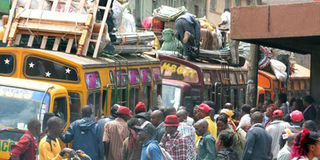Inter-ethnic mistrust ahead of poll worrying

Nairobi residents board buses on August 4, 2017 to head to their rural homes. People fear the possibility of violence during elections. PHOTO | DENNIS ONSONGO | NATION MEDIA GROUP
What you need to know:
- Much more needs to be done to address inter-ethnic mistrust and competition, to foster greater cohesion.
As we approach the August 8 elections, there are widespread reports of people moving away from the place where they live and work to somewhere more closely associated with their ethnic community.
In this vein, many Luo and Luhya are reported to be travelling from Naivasha and Nakuru to Nyanza and western Kenya, while many Kisii are said to be leaving their rural homesteads in the Rift Valley.
VOTING
In turn, a number of Kikuyu are reported to be leaving Lamu and Kisumu, while many non-coastal communities are reported to be leaving, or to be planning to leave, Mombasa.
Many are travelling because they opted to register to vote — not in the place where they are currently living and working — but in the area they regard as their rural home.
This may be the place where they grew up or their parents or grandparents live, or the place where they plan to build a house, grow old and be buried.
INTIMATE
For some, this decision to register “at home” was motivated by a desire to vote in the locality that they have the most affinity with.
In this way, many Nairobi residents, for example, will travel out of the city to choose local leaders and development trajectories alongside their kith and kin.
For others, a decision to register in a communal home was motivated by the painful memories of election-related violence and a desire to be part of a local majority.
ETHNIC VOTING
However, it is clear that many of those who have already travelled, or are planning to travel, have registered to vote where they are living.
Moreover, while some will vote early and then travel, and others — such as those who have recently left Mt Elgon — have moved to nearby areas and may briefly travel back to their polling stations to cast their votes, a large number of Kenyans will end up being disenfranchised.
Unfortunately, some actively encourage such movement.
Since, in the face of strong ethnic voting patterns, the departure of members of a particular community can render it more likely that one’s preferred candidate will win at either the national or local level.
SAFETY
However, many — including a number of politicians and activists — are worried about such movements, and the damage that it could do to their vote.
In this vein, Luo leaders in Naivasha are holding regular meetings with residents along the lakeside, and organising peace activities, to try and encourage people to stay and vote.
Similarly, in Uasin Gishu, Governor Jackson Mandago — who was recently endorsed by National Super Alliance (Nasa) flagbearer Raila Odinga — is trying to reassure non-Kalenjin residents of their safety; while one of the parliamentary candidates in Mt Elgon, Mr Fred Kapondi, is trying to stem the movement of people away from Kopsiro, which is generally regarded as a stronghold for both himself and President Uhuru Kenyatta.
PEACEFUL
Given the limited violence in 2013, the fact that the campaigns have been relatively peaceful in many of the areas that people are now moving away from, and these efforts to encourage people to stay and vote, why are so many people moving?
The short answer is that people are worried about the possibility of post-election violence and do not want to be in an area where the majority support a side of the political divide which their ethnic community is regarded to oppose.
TIGHT CONTEST
In this way, many Kikuyu or Kalenjin who are closely associated with Jubilee are concerned about residing in Nasa strongholds; while many Luo, Luhya and Kisii, for example, feel unsafe in Jubilee strongholds.
In large part, such concern is fuelled by memories of 2007/2008.
However, it is also fuelled by a close presidential race and fears that the loser may reject the results.
MSANDO'S MURDER
The latter is now widely regarded as more likely in the wake of Independent Electoral and Boundaries Commission ICT manager Chris Msando’s murder if the electoral technology fails.
However, it also reflects how the campaigns have once again whipped up a sense of ethnic division and difference; and of how, despite devolution, the presidency is still viewed as the main prize.
The implication is that much more needs to be done to address inter-ethnic mistrust and competition, to foster greater cohesion, and to tackle a winner-takes-all political logic.
Gabrielle Lynch is a professor of Comparative Politics at the University of Warwick, UK. [email protected]; @GabrielleLynch6





